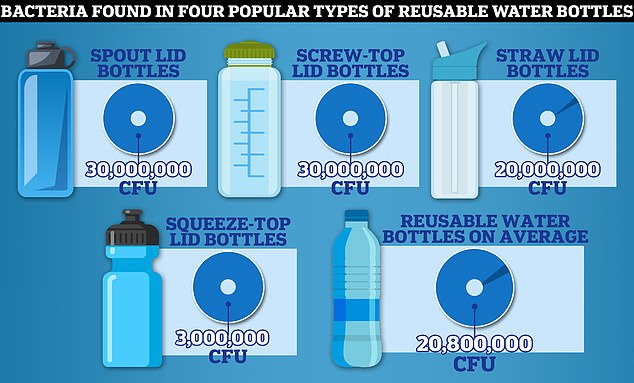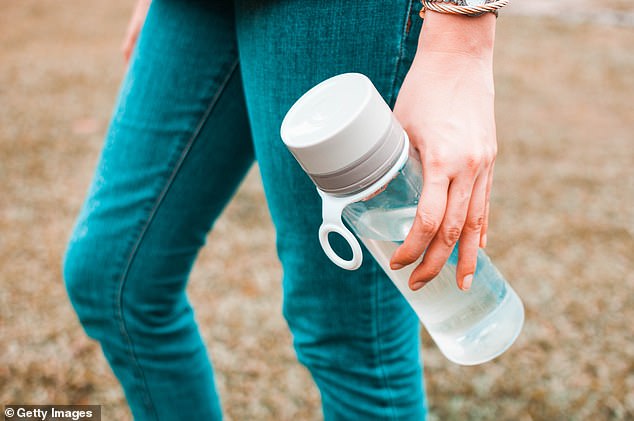They’re an eco-savvy solution to Earth’s plastic pollution crisis.
That is, if you can stomach the grim army of bacteria lurking inside your reusable water bottle.
Stomach-churning studies have suggested the bottles, adored by gymgoers and Love Island stars alike, can harbour 40,000 times more bacteria than the average toilet seat.
For this reason, some experts have described them as being like a ‘portable Petri dish’.

Researchers behind US-based waterfilterguru.com carried out one of the grimmest studies into the bugs lingering in our water bottles yet. The study examined how colony-forming units (CFUs) were inside four popular types of water bottle. This is a unit commonly used to estimate the concentration of bacteria in a test sample. On average, they contained 20.8million CFUs of gram-negative bacteria

Researchers also found two types of bacteria present in reusable water bottles: gram-negative rods and bacillus. Gram-negative bacteria including E. Coli and Klebsiella, can a number of serious infections such as pneumonia. While certain types of bacillus can also lead to gastrointestinal issues including nausea, vomiting, and diarrhoea
To prevent a build up of bacteria, experts instead recommend washing your bottle daily ‘using hot soapy water’.
US-based waterfilterguru.com, a team of water treatment experts and member of the Water Quality Association, carried out one of the grimmest studies into the bugs lingering in our water bottles yet.
They found two types of bacteria present: gram-negative rods and bacillus.
Gram-negative bacteria including E. Coli and Klebsiella, can trigger a number of serious infections such as pneumonia.
While certain types of bacillus can also lead to gastrointestinal issues including nausea, vomiting, and diarrhoea.
The study examined how colony-forming units (CFUs) were inside four popular types of water bottle.
This is a unit commonly used to estimate the concentration of bacteria in a test sample.
On average, they contained 20.8million CFUs of gram-negative bacteria.
Spout and screw-top lid bottle appeared to harbour the most, at 30million CFUs.
For comparison, a toilet seat has 515.
With an average CFU count of 20.8million, reusable bottles can harbour up to five times the amount of bacteria found on a computer mouse (5million) researchers found.
It also accounts for a staggering 14 times the quantity recorded than a pet bowl, with an average of 1.48million CFUs.
Other studies have suggested similar values.
Researchers at US based indoor air quality laboratory, EmLab P&K, recently found more than 300,000 CFUs per square centimeter on each of the 12 water bottles they tested.
Yet despite the warnings, experts told MailOnline there was little evidence that the types of bacteria found in these water bottles are harmful to humans.
Dr Andrew Edwards, a molecular microbiologist at Imperial College London, said: ‘The human mouth is home to a large number and range of different bacteria.
‘So it’s not surprising that drinking vessels are covered in microbes.’
However he also cautioned that household objects including water taps are already riddled with harmless bacteria.
Dr Edwards added: ‘Whilst it’s important to keep bottles clean, using hot soapy water, the simple presence of bacteria is not necessarily a problem.
‘And there’s no evidence from this study that the types of bacteria found are harmful to humans.
‘Indeed, domestic water taps are often colonised with many bacteria which have no harmful effects on humans.’
Meanwhile, Dr Simon Clarke, a microbiologist from the University of Reading, told MailOnline: ‘It really depends on what the bacteria are as to whether it’s a problem or not.
‘Having high numbers of bacteria might be a flag something hasn’t been cleaned in a while, but it’s not necessarily dangerous.
‘I’ve never heard of someone getting sick from a water bottle, similarly taps are clearly not a problem, when did you last hear of someone getting ill from pouring a glass of water from a tap?’
He added: ‘Water bottles are likely to be contaminated with the bacteria that are already in people’s mouths.’












